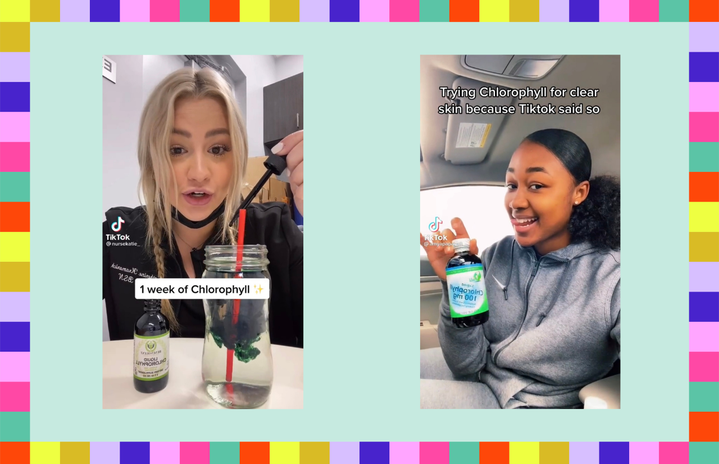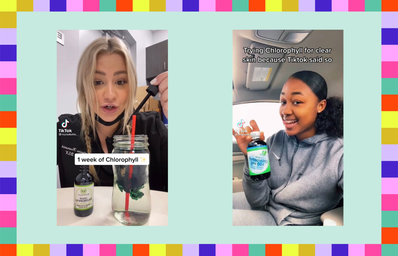If your TikTok algorithm is anything like mine, you must have seen the liquid chlorophyll TikTok trend. I’ve seen countless creators claim that drinking liquid chlorophyll, a plant extract, cleared their acne, calmed their digestive issues, or completely removed their body odor. I wanted to see if it lived up to the hype!
First of all, what the hell is chlorophyll, and why would anyone drink it? According to Science Daily, chlorophyll is the green pigment that helps plants and algae photosynthesize. It aids them in converting sunlight into energy. So why should we drink it?
Lisa Moskovitz, a registered dietician and CEO of NY Nutrition Group, sheds some insight on the potential benefits of Chlorophyll. “The major question is are you acquiring that much more benefit from taking chlorophyll in supplement form versus eating more green veggies?” she tells Her Campus.
We have to understand that this element is in most green fruits and veggies. Every time you eat a kale salad or a green juice, your body is getting a decent amount of the nutrient. One cup of spinach, for example, contains about 24 milligrams of chlorophyll, according to WebMD. One serving of the supplement I bought from Whole Foods has 50 milligrams, and you can take up to three servings a day.
Not all nutritionists are advocates of chlorophyll supplements. “I think liquid chlorophyll is an unnecessary marketing gimmick. You can get chlorophyll from real foods like vegetables and herbs, plus then you also get the other benefits that those foods contain too,” says Sammi Haber Brondo, M.S., a registered dietician and author of The Essential Vegetable Cookbook.
It’s important to note that there is very little research to show that liquid chlorophyll will actually provide any benefits. And if you’re wondering about adverse effects, there are a few potentials. Supplements are not regulated by the U.S. Food & Drug Administration, so there is a chance of negative side effects like digestion issues or teeth staining.
“Generally, chlorophyll supplements are safe to consume and pose little to no harm. Some people may experience digestive discomfort, but it is not commonly reported and depends on the dosage as well as other factors,” says Moskovitz.
In my research, I learned something surprising. The supplements I see people take on TikTok are actually not Chlorophyll, but a semi-synthetic, water-soluble version of it — chlorophyllin. This synthesized version is easier for the body to absorb.
With a basic understanding and healthy skepticism of chlorophyll, I was ready to start a week-long journey of testing the supplement. I decided to start slow, after hearing multiple TikTokers mention that they had stomach pain after starting chlorophyll.
Day One
On my first day, I took one serving of the supplement in a large cup of water. I don’t mind the taste — a light, minty flavor — but mixing it with about 28 oz of water disguises the taste well. Thankfully, I didn’t have any sort of stomach upset after taking my first dose.
Day Two
This challenge started off pretty slow. I didn’t see any immediate changes, but I didn’t mind adding the drops to my water. I upped the dosage to twice a day, or 100 milligrams daily.
Day Three
Today, I decided to switch things up. I put two servings of the liquid Chlorophyll in my post-workout green smoothie, and I couldn’t taste it at all! Adding it to a smoothie is a simple way to get some extra greens in, and it made the smoothie a gorgeous dark green color.
I still couldn’t notice any results by day three. I went ahead and took the full three doses, and continued that for the remainder of the week.
Day Four
I woke up on day four dreading taking the chlorophyll. I realized I just missed drinking normal water. I’d drunk so much water over the past few days, and it all tasted a little minty. So, I decided to take the supplement in a much smaller cup of water. I mixed about 4 oz of water with the 15 drops. The flavor was much stronger, but it was easier for me to take it as a shot three times a day than mixing it with big glasses of water.
From this day on, I took the supplement twice a day as a shooter, and once a day in a cup of water. Until this point, this challenge forced me to drink a lot more water than normal, over 84 ounces a day! I was determined to keep up this hydration streak.
Day Five
This was the day I saw the first signs of the chlorophyll working. I am pretty sensitive to gluten — if I eat it more than four or five times in a week, my stomach expands like a painful, bloated balloon. I ate a bagel at dinner, and usually this would cause me some discomfort.
After eating, I took a shot of chlorophyll, and had no stomach discomfort at all! I’m hesitant to totally credit this to the supplement, but it definitely could be thanks to the chlorophyll.
Day Six
Okay… maybe this actually does reduce body odor. I was skeptical, but after a hard workout today, I didn’t smell at all. After yesterday’s de-bloating, I started to have more faith in the benefits of liquid chlorophyll.
At the end of this week, I didn’t see much noticeable change. My skin, which is pretty unproblematic on its own, definitely had a nice glow — that could have been from the hydration though. I didn’t notice a change in my gut health, or body odor. As Moskovitz tells Her Campus, “Whatever results you achieve from taking these supplements will only last as long as you continue to take them. It is a long-term commitment.” So in order to see drastic changes, chlorophyll would have to become a permanent part of my routine.
Overall, I really enjoyed incorporating this supplement into my routine. It encouraged me to drink more water and green smoothies, and I didn’t feel any adverse effects. Will I continue taking chlorophyll? Probably, until my $11 bottle runs out. And, would I recommend it? Sure! Of course, it is always best to consult with a doctor before adding a supplement to your diet, but I think it’s worth a shot (pun intended).
Experts:
Lisa Moskovitz, Registered Dietician and CEO of NY Nutrition Group
Sammi Haber Brondo, M.S., Registered Dietician and Author of The Essential Vegetable Cookbook


